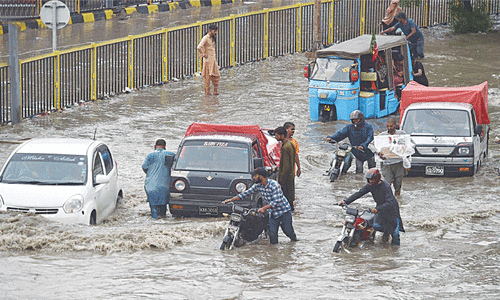Unprecedented Monsoon Rains Hit Pakistan, Causing Widespread Destruction
Pakistan has been hit by intense monsoon rains, leading to severe flooding and significant loss of life. Over the past two days, 21 people have lost their lives due to the heavy downpours, with many more injured. The impact has been felt across multiple regions, particularly in cities like Lahore, Rawalpindi, and Islamabad, where torrential rain has caused streets to flood and disrupted daily activities.
In Lahore, several neighborhoods such as Garhi Shahu, Islampura, Chauburji, and Johar Town experienced heavy rainfall. While the rain brought temporary relief from the scorching heat, it also led to waterlogging and traffic disruptions. Similar conditions were reported in other parts of Punjab, including Gujranwala, Gujar Khan, and Multan, where residents faced similar challenges.
The situation has been particularly dire in areas like Karak, where roads turned into ponds, and in Hazara and Khanpur, where overflowing streams have flooded homes and nearby settlements. According to the Pakistan Meteorological Department (PMD), the current monsoon spell is expected to continue for several more days, especially in Lahore and across Punjab.
Tragic Consequences of the Rain
The heavy rains have led to numerous tragic incidents. In Sheikhupura, a roof collapse resulted in the death of two children. In Pakpattan, four individuals were rescued from the rubble after a similar incident occurred. A cloudburst in Gohraabad, located in the Jhelum Valley, caused extensive damage to homes, vehicles, and roads. In Punjab alone, nine people have died, and multiple others have been injured due to these weather-related events.
Balochistan has also been severely affected, with 10 fatalities and seven injuries reported in different districts. The rising water levels in the Indus River at Kundian have raised concerns, with the Chashma Barrage recording an inflow of over 373,000 cusecs. Authorities are closely monitoring the situation, as low-level flooding is expected at several critical points along the Indus and Chenab rivers.
Warnings and Preparedness Measures
The National Disaster Management Authority (NDMA) has issued a nationwide alert, warning that the rain will continue and that there is a potential for further flooding and landslides until at least July 10. Major rivers such as the Kabul, Jhelum, and Chenab are expected to swell, increasing the risk of additional damage.
Local streams and hill torrents in areas like Dera Ghazi Khan, Rajanpur, and parts of Balochistan, including Sibi and Zhob, may experience dangerous surges in water flow. Emergency teams remain on high alert, and residents in vulnerable areas are being urged to stay cautious.
The Provincial Disaster Management Authority (PDMA) has emphasized that the monsoon activity is likely to persist until July 13. This has prompted authorities to urge communities to take necessary precautions to prevent further casualties and damage. As the rain continues, the focus remains on ensuring the safety of residents and minimizing the impact of the ongoing weather crisis.






